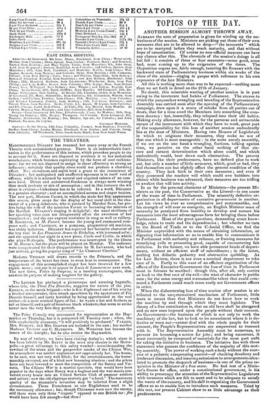TOPICS OF THE DAY.
ANOTHER SESSION ALMOST THROWN AWAY. ALREADY the note of preparation is given for winding up the no of the session. Ministers are picking out those of their own measures that are to be allowed to drop—" the innocents" which are to be martyred before they reach maturity, ana that without hope of canonization. Of course no non-official measure can have any chance after this. The chronicle of the session's doings is all but full : it consists of three or four measures—some good, some bad, none coming up to the exigencies of the times. The Opposition organs are, fairly enough, taunting Sir ROBERT with the backward state of Parliamentary business within six weeks of the close of the session—singing tu quoque with reference to his own exposures of the late Ministers.
All this is nothing more than was to be expected—nothing more than we set forth in detail on the 27th of January.
No doubt, this miserable wasting of another session is in part owing to the inveterate bad habits of Parliament. The excess to which the purposeless wrangling and brawling of the Representative Assembly was carried soon after the opening of the Parliamentary campaign, drew upon it a storm of rebuke from all parties out of doors, that for a time awed the Members into something like com- mon decency : but, insensibly, they relapsed into their old habits. Making every allowance, however, for the perverse and untractable nature of the instrument with which they have to work, great part of the responsibility for this loss of another session undoubtedly lies at the door of Ministers. Having two Houses of Legislature in which to originate their measures, they make no use of that one which is most manageable : in the more unruly assembly, if we see on the one hand a wrangling, factions, talking against time, we perceive on the other hand nothing of that sin- cere and earnest determination which alone could, and which undoubtedly would, bear down such obstruction. The present Ministers, like their predecessors, have no defined plan to work out, but only a number of little measures, which, good or bad, they feel themselves can but slightly affect the general condition of the country. They lack faith in their own measures ; and even if they possessed the resolute will which could awe babblers into silence while business was advanced, their measures are too trifling to awaken that will into activity.
In so far the personal character of Ministers—the present Mi- nisters as the past, the Conservative as the Liberal—is one cause of the waste of time in Parliament. The miserably defective or- ganization in all departments of executive government is another. Let his views be ever so comprehensive and statesmanlike, and his strength of will ever so energetic, an English Minister must of necessity be paralyzed from inability to develop and mature his measures into the most advantageous form for bringing them before Parliament. Most of the great questions, demanding exact know- ledge, relate to trade and the dependencies ; but whether we turn to the Board of Trade or to the Colonial Office, we find the Minister unprovided with the means of obtaining information, or digesting that information so as to enable him to communicate it to Parliament with authority and reliance, or framing measures for remedying evils or promoting good, capable of encountering fair criticism. In the former, we have able permanent heads of depart- ments, without an efficient staff of subordinates ; in the latter, nothing but didactic pedantry and obstructive quibbling. As for Law Reform, there is not even a nominal department to take care of it. Partly to this want of an efficient organization of the offices of the Executive Government the loss of time in Parliament must in fairness be ascribed : though this, after all, only carries us back to the first root of the evil—the want of character in public men ; for the same energy and statesmanlike talent that could com- mand a Parliament could much more easily set Government offices in order.
'When the disheartening loss of time session after session is at- tributed to the unsjstematized mechanism of Parliament, little more is meant than that Ministers do not. know how to work the machine by and through which they must legislate. The theory of a free constitution is, that no old laws shall be abrogated and no new ones imposed upon the people without their consent. As Government—the business of which is not only to work the machinery of the law, but to look to its amendment where it is de- fective or worn out—cannot deal with the whole people for their consent, the People's Representatives are empowered to transact with it. The Representative Assembly must be numerous, to prevent its becoming a screen for jobs ; and being numerous, it must necessarily be composed of materials for the most part unfit for taking the initiative in business. The initiative lies with those statesmen who possess the confidence of the majority of this mot- ley assembly. The power of working such a body without the exer- cise of a pedantic exasperating control—of checking desultory and irrelevant discussion, and insuring submission to arrangementscalcu- lated to promote the despatch of business—is one of the prime re- quisites in the Minister of a free state. No bad test of a Minis- ter's fitness for office, under a constitutional government, is his ability to preoccupy the attention of the Representative Legislature with measures which are felt to meet and to be adequate to satisfy the wants of the country, and his skill in organizing the Government offices so as to enable him to introduce such measures. Tried by this test, our present Cabinet show to as little advantage as their predecessors.


























 Previous page
Previous page